Michael Tainsky
Position Title
Professor
Basic Science
Office Location
Karmanos Cancer Institute
Elliman Building, RM - 3126
421 E Canfield
Detroit, MI 48201
Mailing Address
Office Phone
313-578-4340Office Fax
313-832-7294Education Training
Education
(1977) Ph.D. Biochemistry, Molecular, and Cellular Biology, Cornell University, Ithaca, NY
(1971) B.A. Chemistry (with Honors), New York University, Bronx, NY
Postgraduate Training
(1976-1977) Roche Institute of Molecular Biology, Nutley, NJ with Dr. Herbert Weissbach
Professional Experience
Faculty Appointments
(2012-Present) Professor, Oncology, and Barbara and Fred Erb Endowed Professor in Cancer Genetics at Barbara Ann Karmanos Cancer Institute, Wayne State University, Detroit MI
(1998-2012) Professor and Leader, Program in Molecular Biology & Human Genetics, Barbara and Fred Erb Endowed Professor in Cancer Genetics at Barbara Ann Karmanos Cancer Institute, Wayne State University, Detroit MI
Hospital and Other Professional Appointments
(1998-Present) Member, Barbara Ann Karmanos Cancer Institute
Major Professional Societies
(1998-Present) American Society of Human Genetics
(1993-Present) International Society for Oncodevelopmental Biology & Medicine
(1987-Present) American Association for Cancer Research
(1985-Present) American Association for the Advancement of Science
(1985-Present) American Society of Microbiology
Honors and Awards
(2012) WSUSOM Research Excellence Award for Professor
(2000-Present) Barbara and Fred Erb Endowed Professor in Cancer Genetics
Courses taught
CB 7015: Interdisciplinary Molecular and Cellular Biology
CB 7210: Fundamentals of Cancer Biology
MGG 7015: Introduction to Genetics
MGG 7600: Advanced Human Genetics
Research Interests
Dr. Tainsky is an experienced molecular biologist who has been studying the molecular basis of human cancer for more than 30 years. In 1998, he came to the Karmanos Cancer Institute at Wayne State University School of Medicine, after 13 years on the faculty of the University of Texas, M.D.AndersonCancerCenter in Houston, TX and 8 years at NCI/NIH. He continues to study the biological effects of oncogenes, tumor suppressor genes and transcription factor on tumor cells, and in the Li-Fraumeni Cancer Syndrome, mechanisms of cellular immortalization and senescence. Recently he extended his mechanistic cancer research to translational applications of genomics and proteomics to molecular diagnostics. For the past 12 years his laboratory has developed the epitope cloning technology, protein microarray immunoassays, the methods for identifying the RNA and antigen biomarkers, as well as new informatics tools for the classification. He has published over 135 peer-review papers which have more than 12000 citations. In 2009 he published a 330 page book as editor in the Methods in Molecular Biology Series from Humana Press entitled Tumor Biomarker Discovery drawing 22 chapters from authors around the world including one chapter from his own lab giving detailed protocols into the technology he developed. He was invited to guest edit a Special Issue of the journal Cancer Biomarkers on Antibody Biomarkers Volume 6 and another on Ovarian Cancer Biomarkers. He is currently a guest editor on volumes on Proteomes in Cancer Biomarkers and another on The Basic Science and Clinical Science of Ovarian Cancer. Dr. Tainsky has developed the biopanning technology and immunoassays on protein microarrays for multiple high-throughput projects in cancer diagnostics research. In the area of genetic risk to ovarian cancer, we are currently performing analysis of our whole exome sequencing data from women with breast and ovarian cancer and a family history cancer but without BRCA1/2 mutations. Several novel rare, private genes mutations were identified in proteins associated with homologous recombination, which is highly relevant to BRCA1/2. We recently identified germline cancer genetics in apoptosis genes, a novel and previously unrecognized pathway for cancer predisposition.
Publications
- Baughan, SL, Darwiche, F, Tainsky, MA. Functional analysis of ATM variants in a high risk cohort provides insight into missing heritability, 2022 Cancer Genetics, 264:40-49. PMID: 35354106.
- Choudhry, SC, Lopes, JL, Levin, NK, Kalpage H, Tainsky MA. Germline mutations in apoptosis pathway genes in ovarian cancer; the functional role of a TP53I3 (PIG3) variant in ROS production and DNA repair. 2021, Cell Death and Discovery, 7:62; PMID: 33782397.
- Hurley LC, Levin NK, Chatterjee MC, Coles J, Muszkat S, Howarth Z, Dyson G, Tainsky MA. 2020, Cancer Biomark. Evaluation of paraneoplastic antigens reveals TRIM21 as autoantibody biomarker for early detection of ovarian cancer in combination with TP53 and NY-ESO-1. 27:407-421. PMID: 32083570
- Lopes, JL, Choudhry, SC, Levin, NK, Tainsky MA. FANCM, RAD1, CHEK1 and TP53I3 Act as BRCA-like Tumor Suppressors and are Mutated in Hereditary Ovarian Cancer, Cancer Genetics, 2019, 235–236 57–64. PMID: 31078449
- Wang X, Teer JK, Tousignant RN, Levin AM, Boulware D, Chitale DA, Shaw BM, Chen Z, Zhang Y, Blakeley JO, Acosta MT, Messiaen LM, Korf BR, Tainsky MA, Breast cancer risk and germline genomic profiling of women with neurofibromatosis type 1 who developed breast cancer; Genes, Chromosomes and Cancer, 57:19-27, 2018 PubMed PMID: 28891274.
- Stafford JL, Dyson G, Levin NK, Chaudhry S, Rosati R, Kalpage H, Wernette C, Petrucelli N, Simon MS, Tainsky MA. Reanalysis of BRCA1/2 negative high risk ovarian cancer patients reveals novel germline risk loci and insights into missing heritability. PLoS One. 2017 Jun 7;12(6):e0178450. doi: 10.1371/journal.pone.0178450. 2017. PubMed PMID: 28591191.
- Ahsan S, Ge Y, Tainsky MA. Combinatorial therapeutic targeting of BMP2 and MEK-ERK pathways in NF1-associated malignant peripheral nerve sheath tumors. Oncotarget. 7: 57171-57185, 2016. PMID: 27494873.
- Purcell M, Kruger A, Tainsky MA. Gene expression profiling of replicative and induced senescence. Cell Cycle, 2014; 13(24):3927-37. PMID: 25483067.
Full list of Publications:
